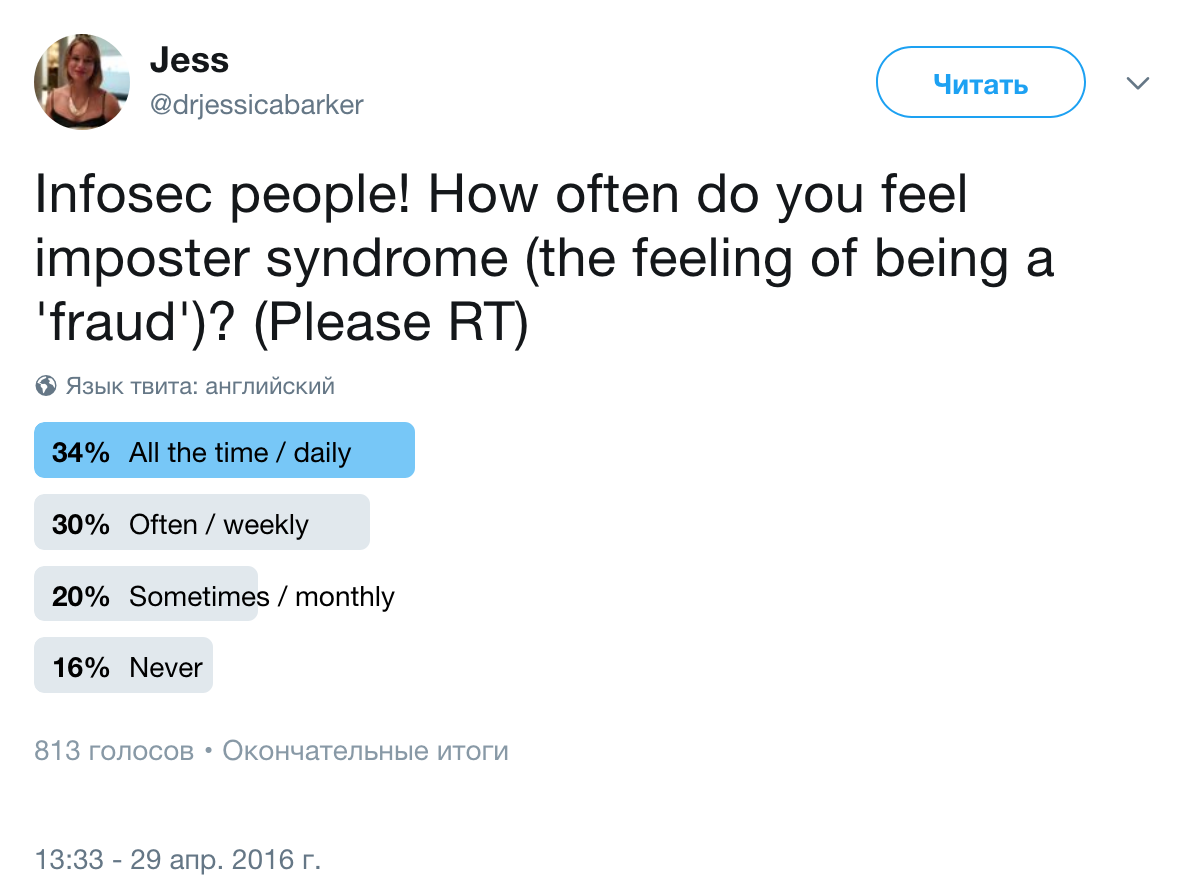Impostor Syndrome

“How often do you feel an impostor syndrome?
Daily / Every week / Once a month / Never »
In April 2016, Jessica Barker conducted a Twitter survey on the topic of how often information security specialists are faced with "impostor syndrome" . The results of this survey formed the basis of Jessica’s report on SteelCon 2016 .
It is unlikely that this one tweet can be qualified as a full-fledged study, but as a quick analysis it will fit. So, the survey showed that 84% of safe persons feel this syndrome at least once a month. This alone makes it possible to classify it as one of the most pressing psychological problems that can be encountered in IT.
The impostor syndrome has already been devoted to a small review on the GT , but it was rather popular. At the same time, the enormous scale of this problem deserves, of course, more attention.
')
Let's try to understand the problematic under the cut.
Disclaimer
This publication on GT is, in fact, a touchstone to find out how the subject of psychology may be of interest to the audience.
A specialist is known to be similar to a flux. To date, the amount of knowledge that a specialist in any field should possess, as well as the required concentration on the specifics of his own profession, have reached the level described by Isaac Asimov in the remarkable story “A trap for simpletons” . A person immersed in the problems of his own industry does not have time to look around. (Azimov, in principle, was a good futurologist and very actively described aspects of psychological science in his books, so this can hardly be considered a coincidence.)
We consider it useful from time to time to submit excuses from the psychological practice to the GT community so that the reader can learn from them something new for themselves.
It is no secret that in general the attitude towards psychology in the CIS countries, especially among specialists in the field of natural sciences, is extremely wary. Of course, in this the role was played by the abuse of psychiatry in the USSR, and not the highest level of various educational institutions that issued diplomas in psychology in the 90s and 2000s.
However, since then much water has flowed under the bridge. In the West, psychotherapy is widely used by people as a tool for solving their own individual life problems. In particular, individual therapy is important for people working under pressure - and in the IT industry, pressure, unfortunately, is today the norm.
Perhaps the introduction of this practice into our longitudes would allow a little bit to change life for the better. Verification of this hypothesis, in essence, is the goal of this experiment.
Let's get started
What is the impostor syndrome
Syndrome impostor called psychological phenomenon, which consists in the inability of a person to accept their successes and achievements as their personal merit.
The impostor syndrome exists in many areas of life. Such as: study, family relations, parenting, professional activities and many others. The author of this article initially faced the impostor syndrome, communicating with his colleagues and fellow students - it turned out that this problem is inherent in the majority of young psychologists. Later it became a discovery for the author that in her other social circles (including among friends from the mathematical and IT environments), the impostor syndrome is also very common.
In this article we will try to describe aspects of this problem as applied to the professional field of information technology.
So, what conditions should be met in order to be able to assume that you have an impostor syndrome? Here are three main ones:
- You explain your successful results in work by various external circumstances: luck, low level of complexity of the solved problem, successful coincidence, etc.
That is, for example, if you quickly coped with the practical task of the interview, then you will think that the simple task was easy, and you were lucky that you asked exactly what you knew. In the case of the impostor syndrome, the idea that you have successfully solved the problem because you are a good specialist will come to your mind as the last thing or not at all. - But the causes of failures and mistakes, on the contrary, you see in your own personal inner qualities: lack of knowledge, lack of intelligence, laziness, etc.
For example, if you did not have time to deliver the project on time, then in the case of impostor syndrome you will not think that such a problem arose due to overloading orders or excessive demands of the authorities. It will be immediately obvious to you: it happened because you are stupid and lazy. - You have problems identifying yourself as a member of the professional community.
That is, for example, despite the fact that you have been in the profession for more than a year and have already achieved a lot of things, you still do not consider yourself a good developer. And some people in this situation and do not perceive themselves as a specialist.

Who is prone to this and why?
To understand the causes of the development of the impostor syndrome, you first need to understand who is more susceptible to it.
Initially, studies of the “impostor syndrome” were focused not on society as a whole, but on individual, randomly selected, “risk groups”. For example, the author of the term, Polina Clans, investigated its manifestations in women who are successful in work and business. However, today there is an understanding that the syndrome is manifested to some extent in people, regardless of their gender, age or other aspects of self-identification.
The initial empirical choice of risk groups, however, was fully justified. Recall that the third key factor in the syndrome is a decrease in identification with the community. The feeling that you do not fit into the community for one reason or another - even having nothing to do with professional skills - can give rise to stress and increased demands on yourself, which, in turn, can lead to the idea of inadmissibility of mistakes, and more more stress. Against this background, the first two conditions for the development of the syndrome gradually begin to be fulfilled: you begin to reproach yourself more for mistakes and increasingly devalue success.
About one aspect of school olympiad psychology
One of the real risk groups are gifted children. We will dwell on this category in detail, especially since the reader below is likely to be close to a reader employed in the IT industry.
What is the problem of gifted children? After all, it would seem that if you study best in the class in certain subjects, you are fond of any academic disciplines, participate in competitions, this should form the feeling that you are smart, talented and ready for new challenges. However, according to the author, this is the paradox of gifted children: giftedness can cause a negative imprint on the psyche.
The fact is that in childhood, or rather, in adolescence, the human psyche has a very important stage of development - the construction of its own worldview and ideas about its place in society. That is, it is important for a teenager to build an adequate image of the world: how he himself can influence the world around him, how the world itself affects him, what goals he can embody in this world, how this world and others relate to him. And all this is just at the time when it is time to decide on a future profession, when most olympiads are held and many circles and special courses open where you can express yourself.
And imagine a teenager who is very easy to solve math problems.
Surrounding peers, teachers and parents, of course, are convinced that mathematics is very difficult. Our young mathematician sees that in the world around him that which is given to him easily is perceived as complex. Against this background, a teenager may have some kind of conflict in his view of the world: it turns out that he somehow does not fit into this world.

Unfortunately, beliefs formed in childhood and adolescence usually have a stronger effect on their entire life than events that occurred in adulthood. So it turns out that the presentation of a gifted teenager that he does not fit into the world around us risks developing in the future into the idea that he does not fit into the professional community. Hello the third condition of the impostor syndrome!
In addition, usually parents and teachers of gifted children are very proud of them, praising their achievements. A gifted child begins to feel that their praise is not quite adequate: after all, he is so praised for what he thinks is so light! And when in the future the child faces difficulties and failures, his worldview gives rise to a new conflict: “the world (surrounding, parents) perceives me as an ideal and invincible mathematician, but this is not true, because in fact I can’t solve all problems”.
In the future, such a child, in order not to violate the logic of his idea of the world, comes to the idea that those around him were simply inadequately evaluated, but in fact he is far worse than he is perceived. Which, again, leads us to the first two conditions of the impostor syndrome.
I want to back up these calculations with a real example. The author works in a school where talented teenagers are taught in mathematics and programming. And every year we see how many guys sincerely consider themselves idiots from the fact that, for example, having reached the final stage of the All-Russian Olympiad of schoolchildren, they failed to solve all the problems or get a diploma of a winner. They say that the previous stages of the Olympiad were completed only because they were lucky and the tasks were easy, but in the end the bitter truth came to light - they are really stupid.

A small insert for parents of gifted children. It is imperative to praise your children, but it is not worth praising for those achievements that the child himself no longer perceives as significant, since for him these are already too easy tasks. In addition, it is impossible to broadcast to your child, that he is perfect and all-powerful: you should definitely make him understand that even the god of his work can make mistakes, and mistakes are normal.
Other causes of the impostor syndrome
So, the following factors contribute to the development of the impostor syndrome in the professional community:
- Your image of an ideal or typical representative of your profession does not coincide with your physical or mental data;
- In adolescence, you got the impression that you do not fit into the world around you (gifted children, children subjected to harassment or violence, etc.);
- In adolescence, you were given an inadequate (in your opinion) assessment (gifted children).
In addition, there are other origins of the impostor syndrome. Here are some of them:
- The conviction of the inexcusability and the inadmissibility of errors. This belief, unfortunately, is most often formed by parents and teachers in school. It can occur not only when the strict parent directly broadcasts to the child that he has no right to err ever, otherwise he will be punished. But even when the parents idealize the child’s achievements, the child begins to be afraid to disappoint them: he hides his failures and blames himself for them very much. Also, this conviction can be formed due to the too picky teacher in the university or a strict boss.
- Unstable, unsystematic approach of parents to education. When a child with a minus four is punished with a belt, and after a week does not pay attention to a deuce, the child becomes completely disoriented. It is difficult for him to understand what adequate assessment he deserves, respectively, in the future it will be difficult for him to understand whether he is a good specialist or not at all.

- Low self-esteem, a tendency to depression, learned helplessness and other mental causes. There is a lot to say here (and we plan to devote other articles to this in this cycle).
Especially the impostor syndrome is close to learned helplessness. This is a separate interesting topic (especially in the part of the canine psychological experiments on dogs), but it deserves a separate post.
The projection of the syndrome on the IT-community
Let us highlight some features of the professions in the information technology industry, which may contribute to the emergence of the impostor syndrome.
- The need to constantly learn new things.
IT-area is developing rapidly. Professionals in this field are faced with the need to spend considerable effort on the study of new technologies, often outside the main working time. Because of this, a specialist may feel that he is not in time for everything, and, as a result, is not competent enough. That, of course, can lead to the development of impostor syndrome.
The phrase “how not to go crazy” appeared in five different applications for reports at the RIT-2017 conference. Two of them were selected by the Program Committee: [1] , [2] - The need to interact with experts who may be more competent than you in a particular area.

Partially this item is a consequence of the previous one. Technology is developing at an insane pace , and there is a need to seek help. At the same time, IT communities are very widely represented on the Internet , which makes interaction with other specialists very accessible.
Thanks to this, you often come across colleagues who understand something much better than you. Against this background, you may develop beliefs that you are compared to such cool guys! - absolutely nothing of yourself, as a specialist.
Here, say, halvomes . From him only one skill is required - the ability to interfere with halvah. In order to feel like a good employee, he doesn’t need to spend time after the shift to communicate with other halvomestoy, in order to gain new skills. He already has all the necessary skills, you just need to comply with the production rate. Accordingly, the impostor syndrome does not threaten him. - The inevitability of a large number of errors in the work.
Much of the time in writing code is spent on its debugging, code review and error correction. If a person initially perceives his mistakes as something terrible - and to avoid mistakes is almost impossible - then the problems of an impostor can hardly be avoided. - Lack of feedback in some projects.
Often the manager is inclined to limit himself to a formal, concise assessment of the employee’s work, if he is satisfied in principle with his results. For many employees who are unsure of their own performance, this looks like a neglect of the results of work and as an indicator of dissatisfaction on the part of the manager.
Perhaps you yourself see any other causes of the impostor syndrome? Share in the comments - or in a personal message. It does not bind you to anything.
What is the dangerous impostor syndrome?
- First of all, with the impostor syndrome, the emotional sphere of the psyche suffers.
Think for yourself: if an adequate assessment of your professional activity is not available to you, all failures and failures are recorded on a personal account, and all achievements are not your merit, then what will happen to your level of stress and anxiety? Naturally, in this case, anxiety and stress are doomed to rise, which negatively affects literally everything.
Due to the inadequate assessment of their achievements, more and more often, the upcoming conversation with the management will make you think that you will be deprived of bonuses or fired.
Surely, some of you will find stories about developers who, in the process of working on some project, “fell out” for several days or weeks, chopping off contacts. The author knows of cases when leading engineers did not come to the accounting department for months for a salary, because they considered themselves unworthy to receive it.
It is likely that one of these people became a hostage of the impostor syndrome: performing a complex project, they faced difficulties (which is normal), but their attitude to difficulties as something terrible brought them to the state of “yes, I’ve never what is not capable of! ". And, like a panic, they just threw everything. Well even if after some time returned to work.
In advanced cases, the impostor syndrome can be one of the predictors of depression.
- If you do not perceive the results of your work as your merit, it is obvious that pleasure from work decreases, and, most importantly, your inner motivation for activity decreases.
Professional (as well as, by the way, and training) motivation can be very conditionally divided into internal and external.
External motivation is when the main incentives for your activity are primarily various external factors: wages, the need to pay a mortgage, the beautiful pathetic office of Apple , etc.
Intrinsic motivation is when your work is important to you first of all, because you get pleasure from the process itself: writing quality code, having tangible results, satisfaction from the activity itself.
Many studies show that if an employee works only on extrinsic motivation, then the efficiency of such an employee’s work is significantly reduced. Internal professional motivation is very important: if you love your work, get pleasure from it, then you will be more immersed in it.
Say, if you need to complete a complex project, and you like the process itself, and you believe that you are able to put an idea into practice, then you will spend less time on this task, since you will work more intently. Whereas a person with an impostor's syndrome will be - constantly! - to be distracted by your doubts about whether you will succeed at your negative emotions (anxiety, fear of being wrong), for occasional runaways in the smoking room with thoughts “Yes, which of me is an expert? Who am I kidding?".
Also, without an intrinsic motivation for an employee, only an external, whip-like one remains. "If I can't do it, they'll fire me." "A girl will leave me." “I will become a lonely homeless person” - someone may be funny, but these are real examples. All this adds more and more stress. - Violation of goal setting. With an impostor syndrome, you cannot adequately assess what you are capable of.
As a result, it is very difficult for you to determine for yourself the range of goals and tasks with which you can cope. It is even more difficult to determine the actual timing of these tasks. Because of this, you start to either abandon some projects, or, conversely, take on too much and / or declare unrealistically short terms of solving the problem. The latter may also be related to the fact that in an impostor syndrome a person has a discrepancy between the idea of how much a true professional should work and the conviction that he is not such a true professional.
That is, processing, in essence, may be associated with the desire to prove to yourself and others that you still have the right to be called a specialist. And it would even be to some extent good if these refineries did not lead to an increase in the number of errors and fakapov. And, as we already understand, the more the experience of experiencing failures in the impostor syndrome, the more pronounced this syndrome.
Thus, the impostor's syndrome grows like a snowball: you either refuse tasks, which increases your faith in your own incompetence, or you take on too many tasks, which can increase the number of errors, which in turn increases your confidence in that you are an impostor.
The circle is closed. - Difficulties in bringing projects to the end.
This paragraph is partly a consequence of a violation of goal setting, as described above. In addition, with the impostor syndrome, you constantly doubt how properly and professionally done the work, whether it is possible to do better.
At the same time, you are afraid to request feedback from your colleagues and supervisor about your own work, as you are afraid that they will accuse you of incompetence and thereby feed off your idea that you are not as good as you would like to consider.
Again the vicious circle, this time - the circle of fear of feedback. - Harm team.
There are many real-life stories about how, because of the impostor syndrome, the developer was afraid to express at everyone that the strategies and problems being discussed are easily solved by an existing library or code, including those written by him.
Such people are afraid to voice their ideas in a team due to doubts about their own competence and professionalism. In this case, they do not allow the manager to see their accomplishments, which limits their career growth, and, as a result, the problem of the impostor is compounded. - Doubts about the correctness of the choice of place of work and profession.
When the impostor syndrome makes you think that you are a bad specialist, when you are obsessed with your failures and think that you will be fired for another failure, you can go so far as to start frantically searching for other vacancies. In the end, it may come to the point that you go to work or study in a completely different field of activity. And it’s far from the fact that at the new place of work you will not be haunted by the same doubts about yourself or regret that you left the old job.
What to do with it?

To understand how to overcome the problem of an impostor, you must have a clear understanding of the symptoms of this phenomenon. Recall once again the three main symptoms of the impostor syndrome:
- Explanation of success by external circumstances: luck, chance, etc. That is, success is worthless.
- Explanation of failures only by internal reasons, such as own stupidity. Thus, failures are exaggerated.
- Feeling like a stranger in a community and a pretender.
In my opinion, the third symptom is to some extent a consequence of the first two conditions. Therefore, it is logical to start working on yourself with symptoms 1 and 2.
The task is to correct the bug of incompetent assessment of one’s own competence: start recording achievements at your own expense, and find other explanations for mistakes and forgive yourself.
If we talk about psychotherapy, then this is the most effective cognitive-behavioral therapy in this problem. However, this does not mean at all that without a psychologist it is impossible to cope with this problem. It is possible to try to get rid of the impostor syndrome yourself. Moreover, now you already know what exactly you need to work on.
- What I think, I know
what you know.
Remember this picture above ? It is useful to return to it.
, .
. : → → - → → →… . , .

, , . - .
Therefore, the first step is to try to catch these moments. That is, the next time you catch yourself on the fact that you are engaged in reactive self-flagellation due to some kind of failure, try to stop and look at this situation from the outside. Well, if you manage to sit down and paint your chain of thoughts and understand where there are logical inconsistencies.
For example, consider the first “logical” link from our example, reformulating it in the format “If ..., then ...”: if I made a mistake, then I am stupid. Think of some alternative explanations for the fact that you made a mistake.
Maybe you just made a mistake from fatigue? From excessive demands or low deadlines? Or maybe you are researching, developing or mastering a new algorithm and it’s hard not to make mistakes? What other explanation could there be? It would be nice to write it in the beginning in some document or notebook, which you could refer to next time.

You can also think what arguments can refute the idea that the mistake you made testifies to your stupidity. Is it possible that other engineers, whom you think are very clever, do not make mistakes? Stackoverflowcan be used as a factor for evaluation: do other people ask similar questions? Do they face similar obstacles? Again, the effectiveness of such a cognitive analysis will increase if you write down your arguments.
As a result of this work, you can see that your attitude towards failures becomes easier. Ideally, you may be able to conclude that certain classes of mistakes and failures are absolutely normal for your work.
After that, it will be easy for you to reformulate for yourself the mistakes and failures into challenges and goals for further improvement as a professional.
Analyze your mistakes and distinguish for yourself what you did correctly, and what kind of action led to this error.

A good example is the recent Gitlab. , 12 , - , 7 .
? , ?
, .

"He is a wonderful person and took care of the backup before work began."
“The more you make, the more mistakes” is a great phrase, if you take it without self-blame.
The analysis of the root causes should be followed by the definition of further steps.
- What can be done in the future for yourself to eliminate the possibility of repetition?
- Instead of correcting the reason in oneself, it may be useful to accept such a property of one’s character and think:
- How can this property wrap itself to advantage? For example, according to some studies , the opposite side of inattention can be creativity.
- What process (code review?) Or what tool can I use to further catch these problems at an early stage?
In parallel with the “work on mistakes”, it is worthwhile to engage in the correction of attitudes toward success: learn to find your own contribution to your achievements.

The wolf is extremely pleased with the results of its activities.
In psychotherapy, a narrative psychological approach is very effective for this . However, again, you can try to go this way yourself. Your task will be to “pull to the surface” of your consciousness those skills, abilities and knowledge that led you to the successful solution of professional tasks.
, , . , , .
, - , , , , .
1-2 . , . , - . ? ?
After you have figured out what good skills you have, try to recall another example of your professional success from the past, where did these skills help you? What other skills helped you solve that problem?
Gradually, you will find that you have many competencies and skills. It does not have to be exclusively professional knowledge (for example, programming languages), but also personal qualities. This is a kind of support on which you rely in solving problems and thereby move higher. Thus, your self-confidence will rise.
Next, you should think about what your goals in the future will help you to realize your skills. What other skills do you want to learn to achieve your goals?
Most likely, after the work done to correct attitudes towards mistakes and achievements, the manifestation of the impostor syndrome will significantly decrease. However, if at this stage you still have the feeling that you do not fit into the IT community to which you belong, then you can separately pay attention to this problem.

It's simple enough: in order to feel part of a community, it is worth more to interact with this community. Visit several IT conferences, take part in professional discussions. This will help you learn not to compare yourself with the ideal spherical specialist, but to evaluate yourself in relation to many real people.
Level up
You need to understand that similar problems occur in responsible employees at all levels of the organizational structure of the company.
Let us examine the question of what actions a manager can / should take to minimize the impact of such problems on department productivity.
What should the team leaders and project managers do in the event of an alleged impostor syndrome among employees?

It is very important for the manager to be able to detect the presence of an imposter problem in his team in time and be able to provide competent support in this case. This can significantly optimize performance and avoid a lot of fakap.
Executive Note with Authoritarian Management Style
, , , . , ( ), . , .
So, if you, as a manager, suspect an impostor’s syndrome with your employee, you have, first of all, the task of giving this specialist adequate feedback on his work:
- , , – . , , .
, , . , ( , , CI/CD), , .
, . , , , .
. , , , . - . , , , . : «, , – , ». , . , , .

, , , , .
IT- , — , , . IT .
— . , , .
Source: https://habr.com/ru/post/370877/
All Articles
